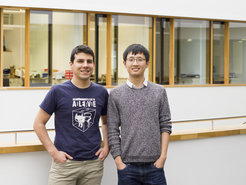Marie-Curie fellowships for Bonafé and Zhang
"A huge honor and a life-changing opportunity" for two young scientists

Jin Zhang came to the MPSD in July 2019 after spending a year as a research assistant at Imperial College London. He had previously completed his PhD at the Institute of Physics, Chinese Academy of Sciences.
In his Marie Curie project, Jin will focus on non-equilibrium dynamics and new correlated phases induced by twisting and doping in two-dimensional heterostructures, including interfacial charge transfer, carrier multiplication, exotic excitons, light-induced Moiré engineering and insulator-metal phase transitions.
He aims to provide a novel theoretical framework to understand and manipulate the different laser-driven non-equilibrium states and photoexcited dynamics in low-dimensional materials.
Franco Bonafé joined the MPSD straight after finishing his PhD thesis at the Universidad Nacional de Córdoba in Argentina. He focuses on the interface between nanooptics and nanomaterials with applications in novel molecular spectroscopy techniques.
“This Fellowship is crucial to establish new collaborations with experimental groups,” says Franco. “This, in turn, will benefit all the research groups involved by developing state-of-the-art techniques that push the limits of current methods, giving us more insight into the atomistic mechanisms of field-driven phenomena.”
By coupling time-dependent density functional theory with the real-time evolution of electromagnetic fields, Franco hopes to shape the fields’ spatial and temporal properties by suitable arrangements of molecules and nanostructures. “Ultimately, this could help predict candidate experimental systems to improve modern spectroscopy techniques,” he explains.
Three experimental groups collaborating in this project will test the techniques. Franco also looks forward to gaining new skills in scientific project management.
“Being accepted as a MSCA Fellow is a huge honor and life-changing opportunity to shape my career as an independent scientist,” he says.
Individual Fellowships from the Marie Sklodowska-Curie Actions program are awarded to experienced researchers with a doctoral degree or at least four years’ full-time research experience. The grant provides an allowance to cover living, travel and family costs, as well as contributions to training, networking and research costs. Nearly 10,000 applications were received for the most recent call. See the MSCA website for further details.












